
Posted on 07/14/2010 4:44:51 AM PDT by Homer_J_Simpson




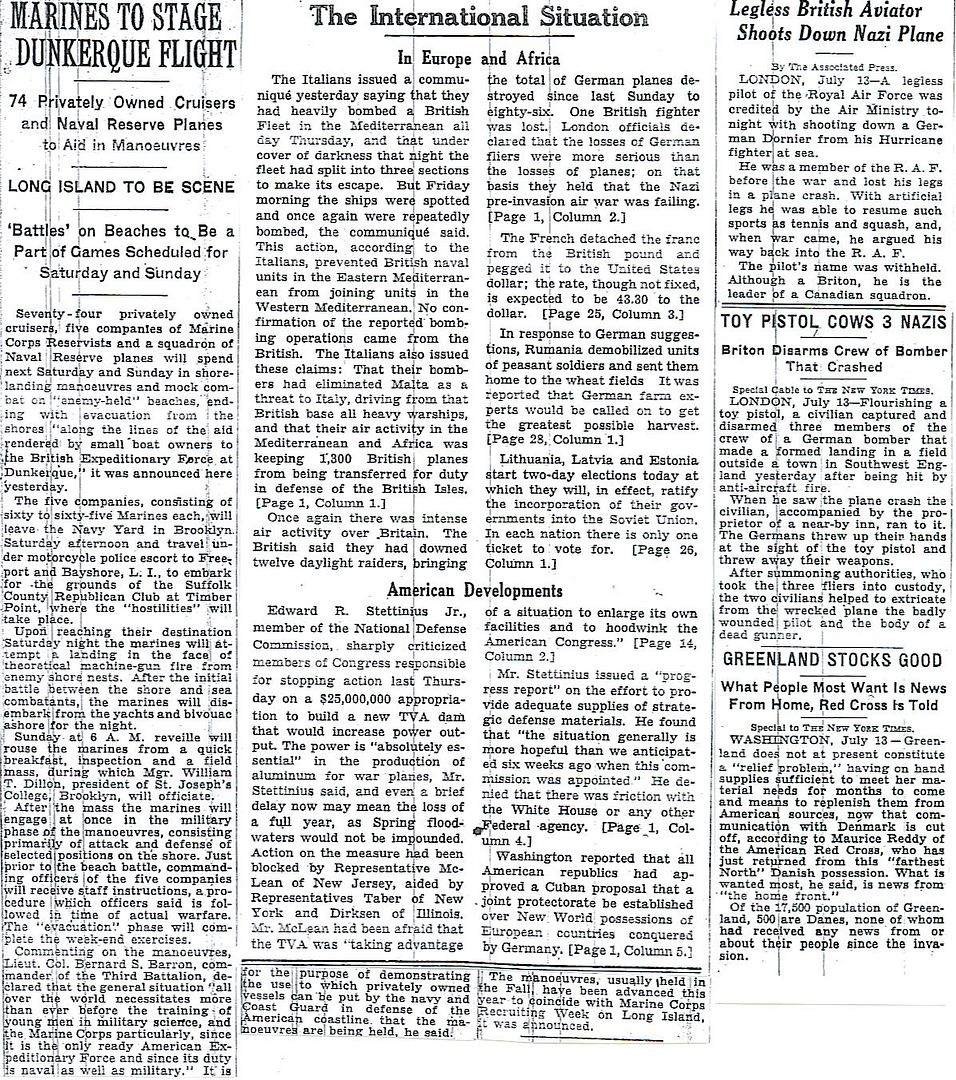
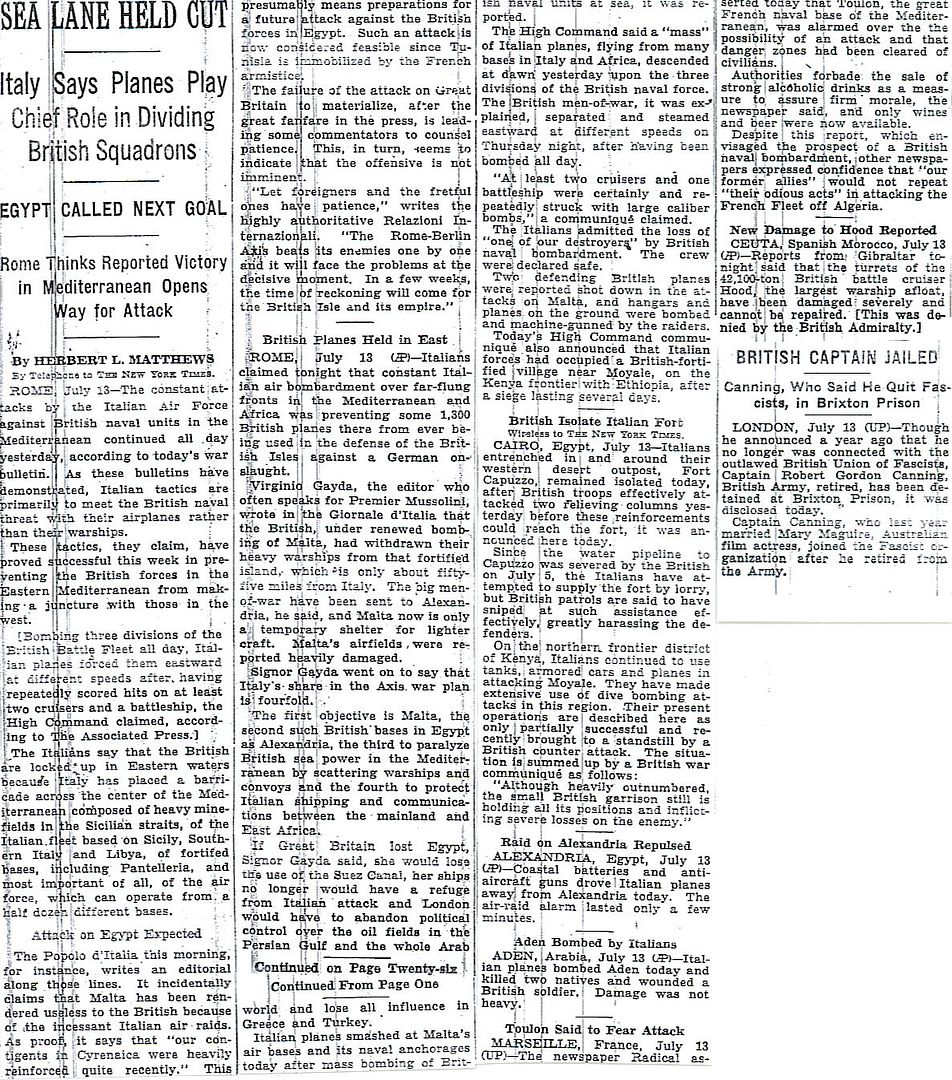





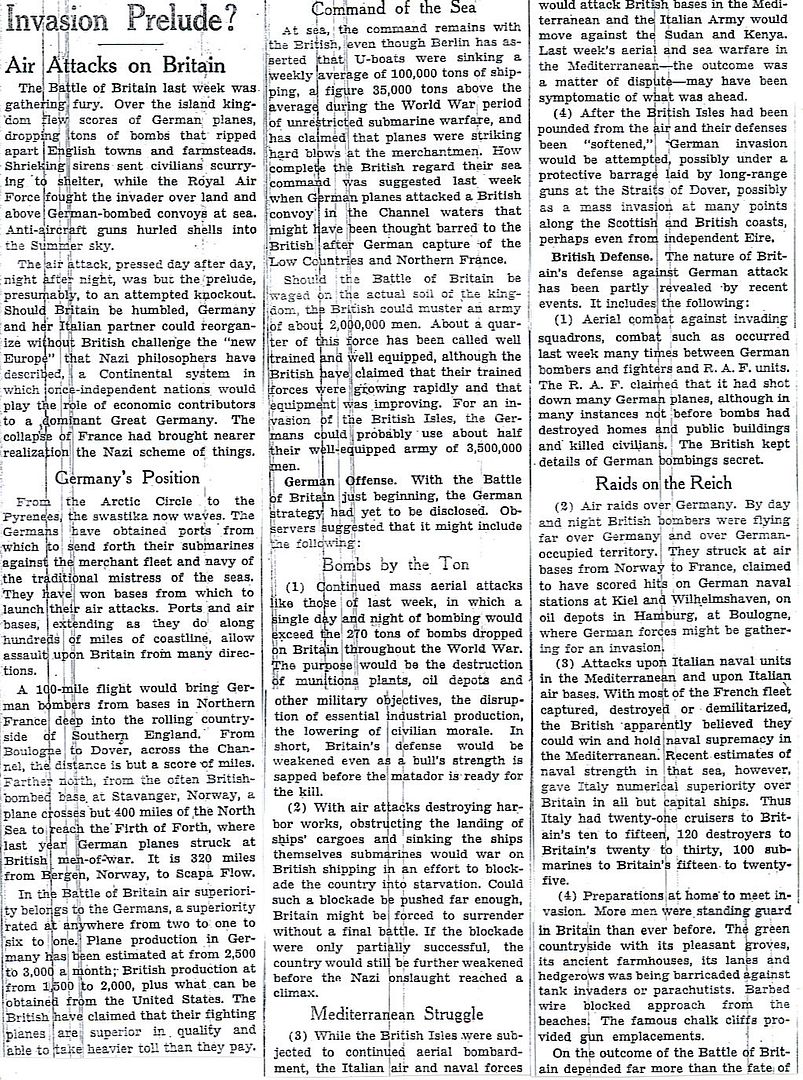
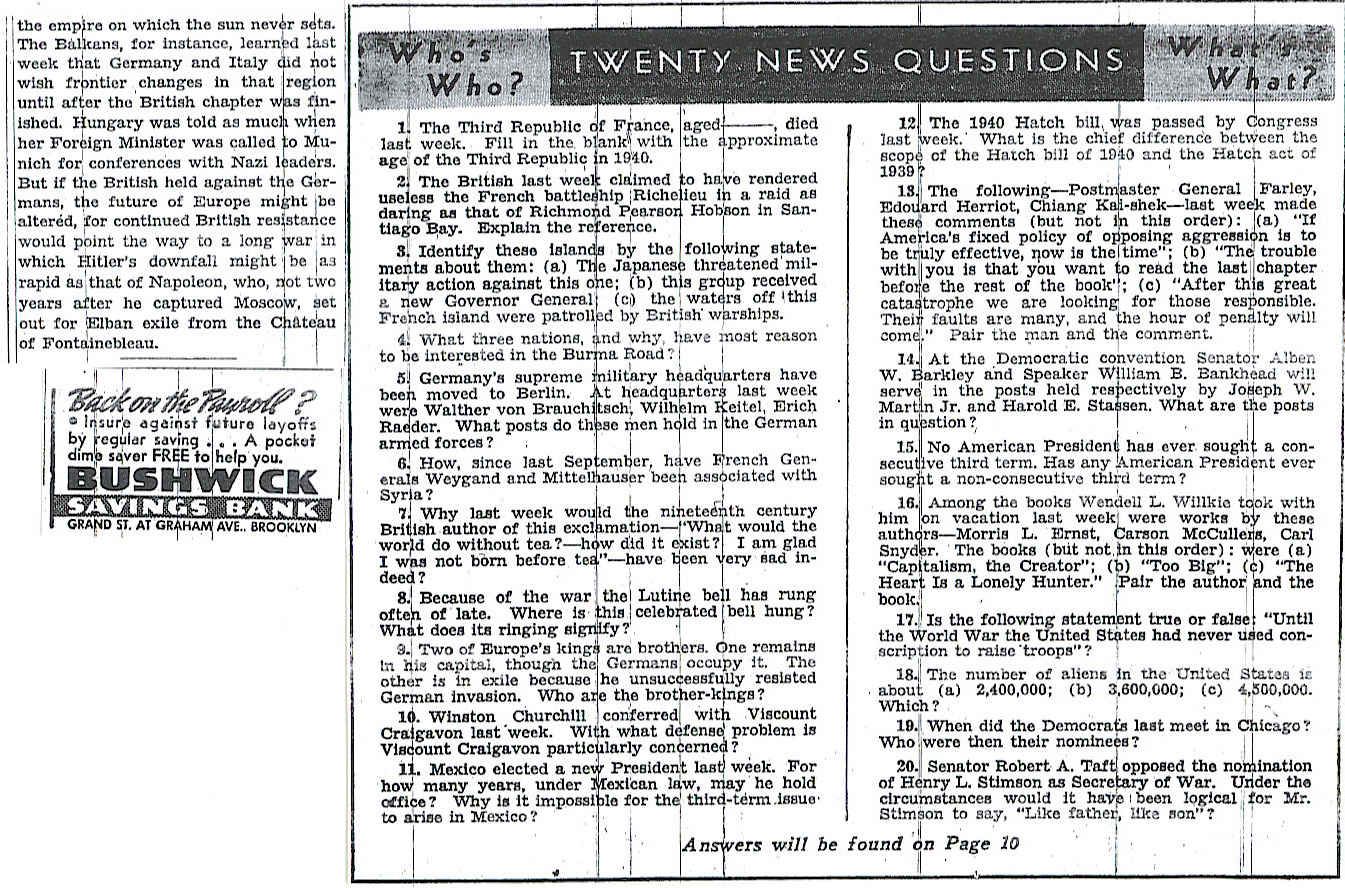


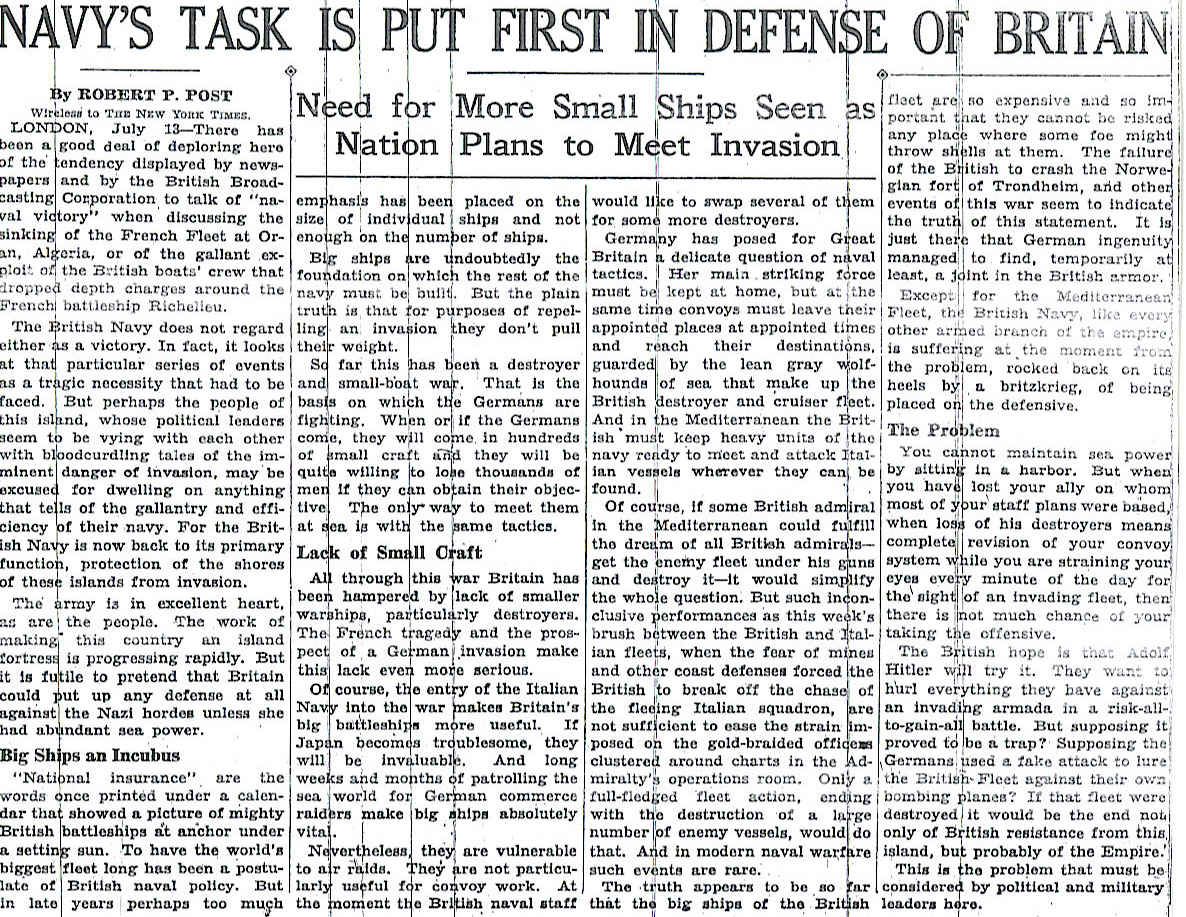



Michael Korda, With Wings Like Eagles: The Untold Story of the Battle of Britain
News of the Week in Review
Invasion Prelude? – 12-13
Twenty News Questions – 13
Europe’s Map – As Two Conquerors Have Carved It (maps) 14-15
Navy’s Task is Put First in Defense of Britain (by Robert P. Post) – 16
Answers to Twenty News Questions – 17
* The pilot’s name was withheld
I am going to spill the beans. I don’t think he would mind a little publicity in the dim and distant future. See reply #3 above.
http://www.onwar.com/chrono/1940/jul40/f14jul40.htm
Vichy mourn on Bastille Day
Sunday, July 14, 1940 www.onwar.com
In Vichy France... It is officially declared the “Day of National Mourning”.
In Britain... General de Gaulle attends Bastille Day ceremonies in London.
From London... British Prime Minister Churchill speaks about the “war of the unknown warriors” in a BBC radio broadcast.
http://homepage.ntlworld.com/andrew.etherington/month/thismonth/14.htm
July 14th, 1940
UNITED KINGDOM:
RAF Bomber Command: 4 Group (Whitley). Bombing - aircraft parks at Paderborn and Diepholz.
10 Sqn. Four aircraft to Diepholz. All bombed. Opposition severe.
51 Sqn. Eight aircraft to Diepholz. All bombed. Opposition severe.
102 Sqn. Ten aircraft to Paderborn. One returned early, nine bombed.
Straits of Dover: Convoys attacked by about 45 Ju87s escorted by fighters. RAF Fighter Command claim 7 enemy aircraft destroyed.
London: General de Gaulle’s Free French volunteers celebrated Bastille Day on foreign soil in London today.
In the morning General de Gaulle, accompanied by Vice-Admiral Muselier, the head of his naval force, and M Labarth, the director of technical services, laid a wreath at the Cenotaph. He shouted “Vive l’Angleterre!” and then “Vive la France!” and the crowd took up his cry. Later, units of the Free French forces marched to the statue of Marshal Foch at Victoria, and 2,000 of de Gaulle’s men attended a film show. Mr. Churchill sent a message saying he looked forward to the time, “not far distant”, when they would celebrate 14 July in France.
ATLANTIC OCEAN: SS Thetis A sunk by U-52 at 47.40N, 13.20W.
At 1145, the unescorted Sarita was hit on the port side in the #7 tank by one stern torpedo from UA and was abandoned by the crew in one lifeboat and two rafts. After one hour, the U-boat surfaced and fired 34 rounds from the deck gun at the tanker of which 11 were hits. The ship developed a list to port and did not sink because the empty starboard tanks kept her afloat, but the U-boat fired with the 2cm AA gun holes into the hull and she sank at 1338. The Germans then came alongside of the lifeboat and took the master on board with the ship’s papers. He was allowed to go back to the boat and after they took care of two injured men the U-boat left the area. The survivors distributed themselves on the rafts, but on 16 July after three ships had passed by without spotting them, all returned to the lifeboat and set sail for Barbados. They were picked up two days later by the British SS Dunstan in 15°31N/30°04W and taken to Pernambuco. (Dave Shirlaw)
http://worldwar2daybyday.blogspot.com/
Day 318 July 14, 1940
Battle of Britain Day 5. Clear weather allows Luftwaffe to attack convoy “Bread” and other convoys in the English Channel. There are dogfights all day and only 5 ships are damaged or sunk. BBC reporter Charles Gardner describes a dogfight from the cliffs of Dover, although he gets many facts wrong in the excitement. http://www.bbc.co.uk/archive/battleofbritain/11431.shtml http://www.doverwarmemorialproject.org.uk/Information/Articles/Incidents/Flames.htm Germans also bomb RAF airfield at Manston in Kent and a destroyer moored in Swanage Harbour, Dorset, causing little damage.
British armed merchant cruiser HMS Esperance Bay leaves Plymouth at 12.50 PM carrying ten million pounds in gold. 100 miles West, she is bombed (7 dead) but is able to return to Plymouth.
German armed merchant cruiser Thor sinks British steamer Gracefield, carrying 7430 tons of wheat and bran, 500 miles off the coast of Brazil. The crew of 36 is taken prisoner.
At 11.45 AM, U-boat UA sinks Norwegian tanker Sarita 100 miles West of Cape Verde. Al 29 crew abandons ship on two rafts and a lifeboat. They are picked up on July 18 by British steamer Dunstan and taken to Pernambuco. At 6.18 PM, U-52 sinks Greek steamer Thetis A. carrying grain, 300 miles West of Brest, France (9 dead, 20 survivors abandon ship in a lifeboat). http://www.uboat.net/allies/merchants/ships/422.html
I didn’t even know John Robinson was into gliders.
Date: 14 July 1940

Enemy action by day
Fighter engagements with the enemy were on a smaller scale due to a reduction of enemy activity near our coasts. What activity there was, however, was almost entirely directed towards attacks on shipping. Bombs damaged convoys off Dover and a naval unit was bombed off Swanage. No damage reported. A convoy off the Norfolk Coast was also reconnoitred, and one raid approached the coast of Montrose. Patrols were maintained over convoys at periods during the day; one enemy aircraft in reporting the position of a convoy, mentioned our fighter escort and no attack resulted.
South and South-West Coasts
From 0600 to 0900 hours very little activity occurred. One raid went through the Straits and disappeared north of Boulogne. An intercepting attempt was unsuccessful. One raid near Poole went inland and back over the sea again sections, and at 0900 hours no reports of bombs dropped or interceptions had been made. Between 0900 and 1100 hours five raids were plotted over the Channel from Start Point to Dungenness. Shortly after 1100 hours two raids approached Swanage and a naval unit reported having been bombed. No reports were received regarding any damage. Hostile aircraft were tracked intermittently between Start Point and Land's End searching for shipping, but no convoys were in the area. Between 1300 and 1400 hours several raids were over convoys near Dover. Our fighters were on escort duty and the raiders turned back.
At about 1500 hours, a number of raids were plotted, assembling behind Calais. In consequence, 3 fighter squadrons proceeded to investigate and intercepted an enemy force of 40 Ju87s, escorted by a number of Me109s over Dover and the Channel. Our aircraft shot down 3 Ju87s, 3 Me109s, and probably destroyed 1 Ju87 and 1 Me109. Our loss was one Hurricane. During this combat, a Hurricane which failed to answer a challenge was attacked by our fighters, whereupon it dived towards sea level and flew off towards France. Two merchant vessels were attacked and a naval unit hit during this engagement.
East Coast
Very little activity was reported off the East Coast. A few isolated enemy reconnaissances were made off Cromer, Skegness and Lowestoft areas, and over a convoy east of Harwich. Two squadrons were sent to investigate, but no contact was made.
Scotland
One raid approached the coast near Montrose at 4,000ft and was reported to be a Dornier. This did not cross the coast but disappeared in a south-easterly direction.
South of Ireland
It was reported that enemy aircraft made reconnaissances as far west as a point south-south-west of Mizen Head.
By night
Several raids were reported over the country from 2200 hours. Bombs were dropped in the Bristol area, north- northwest of the Isle of Wight, Kent and Suffolk. Some 18 raids appeared off the Thames Estuary and Harwich and are suspected of minelaying.

________________________________________
Statistics
Casualties:
Patrols:
Balloons:
Aerodromes:
Organisation:
Air Intelligence Reports
Home Security Reports
First is a play-by-play account of a German attack on a convoy in the Channel and the RAF's engagement with them. This is really cool.
BBC - Charles Gardner on Convoy Attack and Dogfight
Here's another one that's shorter and not as good quality, but you can hear the excitement in his voice.
BBC - Charles Gardner Reports More on Dogfight
Finally I have the speech by Winston Churchill on the British engagement of the French fleet in what is known as the "War of the Unknown Warrior" speech. The transcript is provided by The Churchill Centre.
During the last fortnight the British Navy, in addition to blockading what is left of the German Fleet and chasing the Italian Fleet, has had imposed upon it the sad duty of putting effectually out of action for the duration of the war the capital ships of the French Navy. These, under the Armistice terms, signed in the railway coach at Compiegne, would have been placed within the power of Nazi Germany. The transference of these ships to Hitler would have endangered the security of both Great Britain and the United States. We therefore had no choice but to act as we did, and to act forthwith. Our painful task is now complete. Although the unfinished battleship, the Jean Bart, still rests in a Moroccan harbor and there are a number of French warships at Toulon and in various French ports all over the world, these are not in a condition or of a character to derange our preponderance of naval power. As long, therefore, as they make no attempt to return to ports controlled by Germany or Italy, we shall not molest them in any way. That melancholy phase in our relations with France has, so far as we are concerned, come to an end.
Let us think rather of the future. Today is the fourteenth of July, the national festival of France. A year ago in Paris I watched the stately parade down the Champs Elysees of the French Army and the French empire. Who can foresee what the course of other years will bring? Faith is given to us to help and comfort us when we stand in awe before the unfurling scroll of human destiny. And I proclaim my faith that some of us will live to see a fourteenth of July when a liberated France will once again rejoice in her greatness and in her glory, and once again stand forward as the champion of the freedom and the rights of man. When the day dawns, as dawn it will, the soul of France will turn with comprehension and with kindness to those Frenchmen and Frenchwomen, wherever they may be, who in the darkest hour did not despair of the Republic.
In the meantime, we shall not waste our breath nor cumber our thought with reproaches. When you have a friend and comrade at whose side you have faced tremendous struggles, and your friend is smitten down by a stunning blow, it may be necessary to make sure that the weapon that has fallen from his hands shall not be added to the resources of your common enemy. But you need not bear malice because of your friend's cries of delirium and gestures of agony. You must not add to his pain; you must work for his recovery. The association of interest between Britain and France remains. The cause remains. Duty inescapable remains. So long as our pathway to victory is not impeded, we are ready to discharge such offices of good will toward the French Government as may be possible, and to foster the trade and help the administration of those parts of the great French Empire which are now cut off from captive France, but which maintain their freedom. Subject to the iron demands of the war which we are now waging against Hitler and all his works, we shall try so to conduct ourselves that every true French heart will beat and glow at the way we carry on the struggle; and that not only France, but all the oppressed countries in Europe may feel that each British victory is a step towards the liberation of the Continent from the foulest thralldom into which it has ever been cast.
All goes to show that the war will be long and hard. No one can tell where it will spread. One thing is certain: the peoples of Europe will not be ruled for long by the Nazi Gestapo, nor will the world yield itself to Hitler's gospel of hatred, appetite and domination.
And now it has come to us to stand alone in the breach, and face the worst that the tyrant's might and enmity can do. Bearing ourselves humbly before God, but conscious that we serve an unfolding purpose, we are ready to defend our native land against the invasion by which it is threatened. We are fighting by ourselves alone; but we are not fighting for ourselves alone. Here in this strong City of Refuge which enshrines the title-deeds of human progress and is of deep consequence to Christian civilization; here, girt about by the seas and oceans where the Navy reigns; shielded from above by the prowess and devotion of our airmen-we await undismayed the impending assault. Perhaps it will come tonight. Perhaps it will come next week. Perhaps it will never come. We must show ourselves equally capable of meeting a sudden violent shock or-what is perhaps a harder test-a prolonged vigil. But be the ordeal sharp or long, or both, we shall seek no terms, we shall tolerate no parley; we may show mercy-we shall ask for none.
I can easily understand how sympathetic onlookers across the Atlantic, or anxious friends in the yet-unravished countries of Europe, who cannot measure our resources or our resolve, may have feared for our survival when they saw so many States and kingdoms torn to pieces in a few weeks or even days by the monstrous force of the Nazi war machine. But Hitler has not yet been withstood by a great nation with a will power the equal of his own. Many of these countries have been poisoned by intrigue before they were struck down by violence. They have been rotted from within before they were smitten from without. How else can you explain what has happened to France?-to the French Army, to the French people, to the leaders of the French people?
But here, in our Island, we are in good health and in good heart. We have seen how Hitler prepared in scientific detail the plans for destroying the neighbor countries
of Germany. He had his plans for Poland and his plans for Norway. He had his plans for Denmark. He had his plans all worked out for the doom of the peaceful, trustful Dutch; and, of course, for the Belgians. We have seen how the French were undermined and overthrown. We may therefore be sure that there is a plan-perhaps built up over years-for destroying Great Britain, which after all has the honor to be his main and foremost enemy. All I can say is that any plan for invading Britain which Hitler made two months ago must have had to be entirely recast in order to meet our new position. Two months ago-nay, one month ago-our first and main effort was to keep our best Army in France. All our regular troops, all our output of munitions, and a very large part of our Air Force, had to be sent to France and maintained in action there. But now we have it all at home. Never before in the last war-or in this-have we had in this Island an Army comparable in quality, equipment or numbers to that which stands here on guard tonight. We have a million and a half men in the British Army under arms tonight, and every week of June and July has seen their organization, their defenses and their striking power advance by leaps and bounds. No praise is too high for the officers and men-aye, and civilians-who have made this immense transformation in so short a time. Behind these soldiers of the regular Army, as a means of destruction for parachutists, air-borne invaders, and any traitors that may be found in our midst (but I do not believe there are many-woe betide them, they will get short shrift)-behind the regular Army we have more than a million of the Local Defense Volunteers, or, as they are much better called, the "Home Guard." These officers and men, a large proportion of whom have been through the last war, have the strongest desire to attack and come to close quarters with the enemy wherever he may appear. Should the invader come to Britain, there will be no placid lying down of the people in submission before him, as we have seen, alas, in other countries. We shall defend every village, every town, and every city. The vast mass of London itself, fought street by street, could easily devour an entire hostile army; and we would rather see London laid in ruins and ashes than that it should be tamely and abjectly enslaved. I am bound to state these facts, because it is necessary to inform our people of our intentions, and thus to reassure them.
This has been a great week for the Royal Air Force, and for the Fighter Command. They have shot down more than five to one of the German aircraft which have tried to molest our convoys in the Channel, or have ventured to cross the British coast line. These are, of course, only the preliminary encounters to the great air battles which lie ahead. But I know of no reason why we should be discontented with the results so far achieved; although, of course, we hope to improve upon them as the fighting becomes more widespread and comes more inland. Around all lies the power of the Royal Navy. With over a thousand armed ships under the White Ensign, patrolling the seas, the Navy, which is capable of transferring its force very readily to the protection of any part of the British Empire which may be threatened, is capable also of keeping open communication with the New World, from whom, as the struggle deepens, increasing aid will come. Is it not remarkable that after ten months of unlimited U-boat and air attack upon our commerce, our food reserves are higher than they have ever been, and we have a substantially larger tonnage under our own flag, apart from great numbers of foreign ships in our control, than we had at the beginning of the war? Why do I dwell on all this? Not, surely, to induce any slackening of effort or vigilance. On the contrary. These must be redoubled, and we must prepare not only for the summer, but for the winter; not only for 1941, but for 1942; when the war will, I trust, take a different form from the defensive, in which it has hitherto been bound. I dwell on these elements in our strength, on these resources which we have mobilized and control-I dwell on them because it is right to show that the good cause can command the means of survival; and that while we toil through the dark valley we can see the sunlight on the uplands beyond.
I stand at the head of a Government representing all Parties in the State-all creeds, all classes, every recognizable section of opinion. We are ranged beneath the Crown of our ancient monarchy. We are supported by a free Parliament and a free Press; but there is one bond which unites us all and sustains us in the public regard-namely (as is increasingly becoming known), that we are prepared to proceed to all extremities, to endure them and to enforce them; that is our bond of union in His Majesty's Government tonight. Thus only, in times like these, can nations preserve their freedom; and thus only can they uphold the cause entrusted to their care.
But all depends now upon the whole life-strength of the British race in every part of the world and of all our associated peoples and of all our well-wishers in every land, doing their utmost night and day, giving all, daring all, enduring all-to the utmost-to the end. This is no war of chieftains or of princes, of dynasties or national ambition; it is a war of peoples and of causes. There are vast numbers, not only in this Island but in every land, who will render faithful service in this war, but whose names will never be known, whose deeds will never be recorded. This is a War of the Unknown Warriors; but let all strive without failing in faith or in duty, and the dark curse of Hitler will be lifted from our age.
That is an excellent story. Bader sounds like he was tough as iron. Definitely tenacious.
And a persistent thorn in Dowding's side.
http://www.thesun.co.uk/sol/homepage/features/3048574/Anniversary-of-the-Battle-Of-Britain.html
“”The most famous pilot of all - Douglas Bader - showed just how wicked that humour could be after the war, when he gave a talk at a posh girls’ school.
He said: “So there were two of the f***ers behind me, three f***ers to my right, another f***er on the left...”
At this point the headmistress panicked. She said: “I think you should know, girls, that the Fokker was a type of German plane.”
Bader replied: “Don’t know about that. These chaps were flying Messerschmitts.”””
Disclaimer: Opinions posted on Free Republic are those of the individual posters and do not necessarily represent the opinion of Free Republic or its management. All materials posted herein are protected by copyright law and the exemption for fair use of copyrighted works.